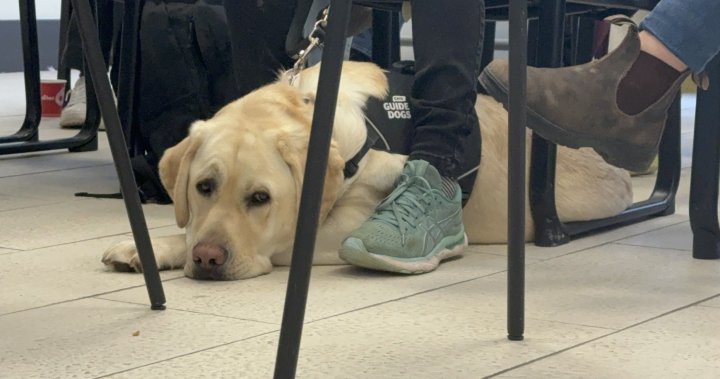A group of dedicated individuals and their guide dogs celebrated a milestone at the Canadian National Institute for the Blind (CNIB) office in Halifax on International Guide Dog Day. Maxine Silva, who has low vision, shared her gratitude for her guide dog Symba during the event, emphasizing how her furry companion has allowed her to live a more independent and fulfilling life. Silva initially hesitated to apply for a guide dog because she believed that only individuals who were fully blind qualified for the service. However, she soon realized that she too could benefit from the assistance of a trained guide dog like Symba.
Guide dogs undergo approximately two years of training before becoming certified to assist individuals with vision impairment. Once the dogs complete their training, they are then matched with new owners to establish a strong partnership. Maria Power, who was matched with her dog Dexter in February, highlighted the importance of trust and teamwork in the relationship between a guide dog and their owner. The guide dog training program at CNIB costs around $50,000, and the organization is facing increasing demand for their services, resulting in some applicants waiting up to four years to be paired with a guide dog. The shortage of guide dogs is partly due to a lack of volunteer puppy raisers, according to Laura Kennedy, a supervisor for the puppy training course at CNIB.
As the demand for guide dogs continues to rise, CNIB is calling for more volunteer puppy raisers to participate in the program. Kennedy emphasized the need for additional volunteers to help meet the demand and ensure that more guide dogs can be placed with individuals who have vision loss. The shortage of guide dogs means that many people on the waiting list may have to wait an extended period of time, if not indefinitely, to receive a guide dog. By recruiting more volunteers to raise and train puppies for the program, CNIB hopes to increase the number of guide dogs available to support individuals with vision impairment in Canada.
The celebration at the CNIB office in Halifax highlighted the profound impact that guide dogs have on the lives of individuals with vision impairment, allowing them to experience greater independence and freedom. Silva expressed her gratitude for Symba and the opportunity to interact with others at CNIB, which she may not have had without her guide dog. Power emphasized the importance of dedication and teamwork in developing a successful partnership with a guide dog. As CNIB works to address the increasing demand for guide dogs, recruiting more volunteer puppy raisers will be essential in ensuring that individuals with vision loss can benefit from the support and assistance provided by these specially trained animals.
In conclusion, the celebration of International Guide Dog Day at CNIB’s Halifax office served as a reminder of the invaluable services that guide dogs provide to individuals with vision impairment in Canada. The dedication of guide dog owners like Silva and Power, as well as the hard work of the CNIB staff and volunteers, demonstrates the importance of supporting and expanding guide dog programs to meet the growing demand for these services. By raising awareness about the need for volunteer puppy raisers and the impact of guide dogs on the lives of individuals with vision loss, CNIB hopes to continue helping more people like Silva and Power access the independence and support they need to thrive.


